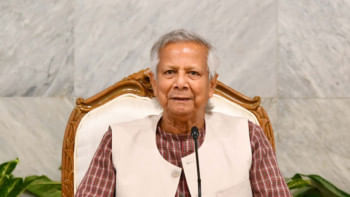Time to go for commercial farming
The 'Millennium challenge' before the Bangladesh agriculture is to graduate itself from the level of subsistence farming to commercial farming and feed a population growing bigger every day with limited resources.
As the country is well poised with a record high food volume in stock, The Daily Star talks to experts, policy planners and farmers to know the nation's aspiration in agriculture sector at the doorsill of a new century beginning today.
Agriculture sector employees, two third of the country's workforce, and agriculture accounts for over 30 per cent of the country's GDP. Subsequent bumper crops in last boro and current aman seasons salvaged a flood-ravaged economy when other sectors including industries, failed miserably.
Former agriculture minister AZM Obaidullah Khan gives his view in favour of establishing better linkage between credit and market, saying that "if organized even small farmers can grow high-value agro-products and upgrade themselves to the level of commercial farming from subsistence farming".
He sees loss in soil fertility, organic materials and scarcity of water as main roadblocks in hindering agricultural growth in the new millennium.
"Although we may have to go for biotechnological maneuvering, the question remains whether we become a new colony of multinationals," he apprehended. A former ranking official of the UN body for Food and Agriculture, Khan, sounds urgency in preserving biodiversity and establishes patent rights on own plant resources.
Dr Mahabub Hossain, head economist of the IRRI, says that countries do not necessarily require self-sufficiency in rice to achieve or sustain food security. He cites the following examples - Malaysia imports 40 per cent of its rice, and wealthy Singapore and Hong Kong have better records of food security than their major rice-growing neighbours do.
The critical factor for food security is "self-reliance", the economist says, which requires favourable export growth so that those with rice deficit can import food from those with surplus. Self-reliance also requires "entitlement," as coined by Nobel laureate Amartya Sen, which is the assurance of productive employment so that people can buy food from the market.
Obaidullah Khan fully agreed with Hossain. Khan said, "employment generation should be the main thrust if we do not want to see more and more unemployed farm labourers in the rural Bangladesh".
"The first sign of civil unrest can often be traced to rising rice prices", says IRRI head economist Dr Mahabub Hossain. Poor distribution and lack of purchasing power are also often responsible for hardship, as experienced in the famines in Bengal in 1943-44 and in Bangladesh in 1974-75, says Hossain.
Abdul Hakim, a farmer in Dinajpur, told The Daily Star how he cherished agriculture to grow in the country in the days to come. To him, pricing of the produces was one of the main factors. Besides, Hakim says that "farmers can always gift the nation with good harvests provided quality seeds and inputs are made available and in time".
Officials in the Agriculture Ministry say that government wants to create an environment where private sectors come up and join efforts in growth of agriculture, till date, the main fuel of the engine of the Bangladesh economy.
Private sector representatives told this correspondent about their willingness to take up the millenium challenge of agriculture. "Lot of possibilities surfaced before us - biotechnology, gene revolution and modern agro-machinery development. What we have to do only is to reach the benefits of these developments to our hard-working farmers", opined one of them.
Experts say that feeding an ever-increasing size of population would be one of the major challenges before Bangladesh in the new millennium. Though the country has successfully controlled its otherwise very high birth rate over the years, they explained, because of a broad population-base that we already have, more new mouths to be fed will be added to put stress on valuable foods that we grow on scarce land.

 For all latest news, follow The Daily Star's Google News channel.
For all latest news, follow The Daily Star's Google News channel. 



Comments